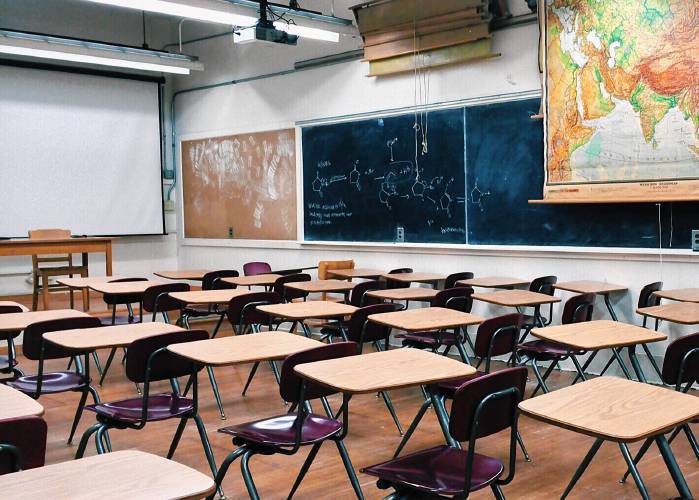Opinion: It’s time to have difficult conversations about antisemitism, including in our schools

Pixabay Pixabay
| Published: 01-04-2024 7:00 AM |
Cindy Rosenwald (D-Nashua) is Deputy Democratic Leader.
As a Jewish woman, I am seeing more and more people acknowledge there is a climate of antisemitism across the globe, in the United States, and, sadly, even here in New Hampshire. Over the past few years, there have been multiple instances of antisemitic attacks in the Granite State, from the destruction of the menorah at Dartmouth to vandalism at the synagogue in Portsmouth.
I remain disappointed, however, that many people appear to believe this antisemitism is new. It is not. Despite these publicly reported instances of attacks on New Hampshire’s Jewish community along with the posting of antisemitic memes on social media by legislators, it seems that some of our state’s leaders have only recently come to accept what Jews have always known: antisemitism is embedded in our history and culture.
Ask any American school child why the year 1492 is important, and you will hear that it’s the date of Columbus’s three ships sailing to the Americas. But what those students are unlikely to know is that 1492 is notable for something else too; it was when all the Jews were kicked out of Spain.
Two specific initiatives are necessary to ensure that students learn about the history of antisemitism. First, the Commission on Holocaust and Genocide Studies must be extended. Second, the Department of Education must clarify that the state law requiring schools to teach about the Holocaust and other genocides is mandatory.
Encouraging conversations about different ideas and beliefs is how society moves forward on an issue, and it is the only way to build understanding and mutual respect for our differences. However, the conversation about antisemitism is not the only one we must reckon with today. Issues of racism, homophobia, Islamophobia, and discrimination are conversations we should and must also be having. Regrettably, the trend as of late, is to stifle those conversations, calling instead for us to retreat into our own echo chambers and inadvertently make the walls between us higher.
One of the best places to examine antisemitism and all forms of discrimination is in our schools.
Public schools have provided the opportunity for people of different races, religions, and economic backgrounds to engage with one another on the various critical issues of the day, the history of our world, and the possible impacts on their lives. This has been deeply integral to the development of our country, a country that strives to ensure equality, understanding, and respect for different beliefs, faiths, and lived experiences. Public schools have been the starting point for so many Americans to gain an understanding of respecting someone else’s religious or ethnic background — an essential part of our American ideals. Limiting discussion on these basic conversations puts our country at risk.
Article continues after...
Yesterday's Most Read Articles
 After four decades collecting carts, Ricky Tewksbury will retire when Shaw’s closes mid-April
After four decades collecting carts, Ricky Tewksbury will retire when Shaw’s closes mid-April
 Written shooting threat sends Concord High students home early
Written shooting threat sends Concord High students home early
 ‘It’s everything’: In largest rally yet, Trump protestors descend on Concord
‘It’s everything’: In largest rally yet, Trump protestors descend on Concord
 DHS email error causes stress, anxiety for New Hampshire's Ukrainian community
DHS email error causes stress, anxiety for New Hampshire's Ukrainian community
 ‘There was no oversight’: NH child advocate has been a watchdog for children's care. Now, the office is on the chopping block
‘There was no oversight’: NH child advocate has been a watchdog for children's care. Now, the office is on the chopping block
Unfortunately, in 2021, Republican legislators in New Hampshire worked to chill our ability to have these vital conversations in our public schools by outlawing what they deemed to be “divisive concepts.” The language of this law is incredibly vague and has made many teachers fearful of discussing topics on race, gender, religion, and even American history in their classrooms.
The recent rise in antisemitism, which has always been lurking among us, is a prime example of why it is so vital that our teachers and students be allowed to have challenging discussions about these “divisive topics.” Understanding the history of the Jewish people, how it led to the Holocaust, and the ripple effects that have led to antisemitism remaining so persistent in our world is the only way to actually combat antisemitism and other prejudices.
We must talk to one another, and we must not be afraid of these conversations. And, most importantly, the decision about what should be discussed in a classroom should be one made in consultation with parents and teachers, not those motivated by scoring political points.
If we truly want to live in an equitable world, we must step out of our echo chambers and make an honest effort to hear and understand the realities of those who have a different lived experience than our own. Schools are not just about learning math and science; they are about fostering the next generation of thoughtful and informed leaders who will build a better society for us all. That better future is only possible if we have these hard conversations, and we are not stifled simply because the truth makes people uncomfortable.







 Opinion: Courage and care count
Opinion: Courage and care count
